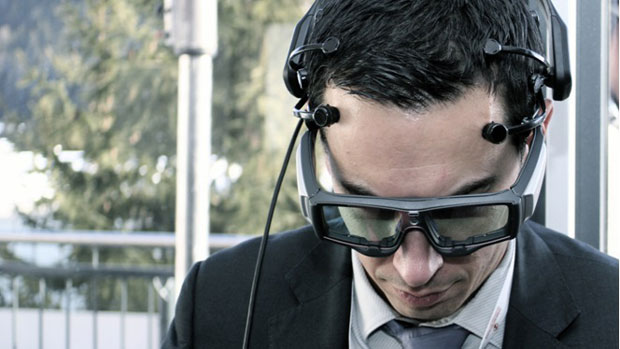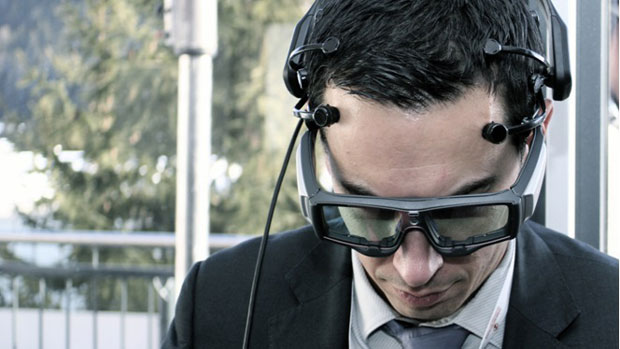Get ready for Singularity: it’s closer to reality than we think
Hooked to a computer, your brain will be able to answer a question before you even knew to ask it

A free daily email with the biggest news stories of the day – and the best features from TheWeek.com
You are now subscribed
Your newsletter sign-up was successful
I HAVE spent a lot of the past week checking out Ray Kurzweil’s world after reading Carole Cadwalladr’s interview with him in The Observer. It is a pretty eye-opening experience. Google’s new director of engineering estimates that computers will gain ‘consciousness’ by 2029 - i.e. when the machines have learned to make their own decisions.
Kurzweil is one of the poster boys of Singularity, defined by Wikipedia as the "moment in time when artificial intelligence will have progressed to the point of a greater-than-human intelligence”. Associated with this are the concepts of Human 2.0 or Transhumanism, which are when humans begin to augment or replace parts of themselves with robots or computers.
Kurzweil has a great deal to say about a future in which we have reverse-engineered the brain - i.e. figured out what every bit of our grey matter does, how and why. According to Kurzweil,
The Week
Escape your echo chamber. Get the facts behind the news, plus analysis from multiple perspectives.

Sign up for The Week's Free Newsletters
From our morning news briefing to a weekly Good News Newsletter, get the best of The Week delivered directly to your inbox.
From our morning news briefing to a weekly Good News Newsletter, get the best of The Week delivered directly to your inbox.
"By 2030, reverse-engineering of the human brain will have been completed and non-biological intelligence will merge with our biological brains.” (He wrote this in 2003 by the way.)
What does this even mean? Well, it means we’ll have connected our brains to computers. They’ll be able to monitor everything we hear, see and think, plus everything in our email box and answer our questions before we’ve thought of them.
Asked recently ‘why would we do this?', Kurzweil responded: “Our search engines will… watch everything we're reading and writing and saying and hearing, and then they'll be like an assistant. It'll say... ‘You were wondering who the actor was in that movie with the robot that can speak six million languages and here she is and here's background about her.’
“Since that helps you through the day, we'll answer your questions before you ask them or even before you realise you have a question, and you'll just get used to this information popping up that you wanted and you'll be frustrated if you're thinking about something and it doesn't immediately pop up without you even having to ask for it.”
A free daily email with the biggest news stories of the day – and the best features from TheWeek.com
Does that sound far-fetched? In fact, we’re already connecting our minds and bodies to computers. I recently met Olivier Oullier , Professor of Behavioral and Brain Science at Aix-Marseille University, who uses wearable technology and neurofeedback to train people out of cigarette addiction and obesity. With the help of some special glasses (see picture below) which monitor where you are looking, a brain monitor that senses and records what parts of your brain are being activated and your mobile phone, he can train your brain to better control food or cigarette craving in a video-game like setting.

Outlier? No. Scientists in Malta have developed software that allows you to control your music (play, fast forward, turn it up to 11) with your brain. Researchers in Washington connected two people’s brains together - allowing one person to control another’s hand movements by thought. The FDA in the US has granted pre-market approval to Neuropace, a company whose brain implant reduces seizures in epileptic patients by identifying dangerous patterns of brain activity.
Meanwhile Braingate has implanted sensors in your brain which allow a woman with tetraplegia to use her thoughts to steer a robot arm to grasp a bottle of coffee and lift it to her lips. The scientists at Proteus combine wearable and ingestible sensors to gather information about medication-taking, activity and rest patterns. Can’t remember if you took your last dose of heart medication? Sensors in the pills will send the information to your phone alerting you to rest easy.
Most of us with an iPhone have experienced Siri’s (in)ability to translate your voice into simple commands. In my experience its better at calling my mother than finding directions to a restaurant, but while there are numerous, humorous examples of #Sirifails you can bet each version will be better.
And with life-blogging devices like Narrative which capture your every move in pictures (a "searchable and shareable photographic memory”) you can see how we might not be too far away from Kurzweil’s vision of predictive search.
#Scaredyet?
Edie Lush tweets at @edielush
-
 Magazine solutions - February 27, 2026
Magazine solutions - February 27, 2026Puzzle and Quizzes Magazine solutions - February 27, 2026
-
 Magazine printables - February 27, 2026
Magazine printables - February 27, 2026Puzzle and Quizzes Magazine printables - February 27, 2026
-
 ‘The forces he united still shape the Democratic Party’
‘The forces he united still shape the Democratic Party’Instant Opinion Opinion, comment and editorials of the day
-
 Claude Code: Anthropic’s wildly popular AI coding app
Claude Code: Anthropic’s wildly popular AI coding appThe Explainer Engineers and noncoders alike are helping the app go viral
-
 Will regulators put a stop to Grok’s deepfake porn images of real people?
Will regulators put a stop to Grok’s deepfake porn images of real people?Today’s Big Question Users command AI chatbot to undress pictures of women and children
-
 Most data centers are being built in the wrong climate
Most data centers are being built in the wrong climateThe explainer Data centers require substantial water and energy. But certain locations are more strained than others, mainly due to rising temperatures.
-
 The dark side of how kids are using AI
The dark side of how kids are using AIUnder the Radar Chatbots have become places where children ‘talk about violence, explore romantic or sexual roleplay, and seek advice when no adult is watching’
-
 Why 2025 was a pivotal year for AI
Why 2025 was a pivotal year for AITalking Point The ‘hype’ and ‘hopes’ around artificial intelligence are ‘like nothing the world has seen before’
-
 AI griefbots create a computerized afterlife
AI griefbots create a computerized afterlifeUnder the Radar Some say the machines help people mourn; others are skeptical
-
 The robot revolution
The robot revolutionFeature Advances in tech and AI are producing android machine workers. What will that mean for humans?
-
 Separating the real from the fake: tips for spotting AI slop
Separating the real from the fake: tips for spotting AI slopThe Week Recommends Advanced AI may have made slop videos harder to spot, but experts say it’s still possible to detect them